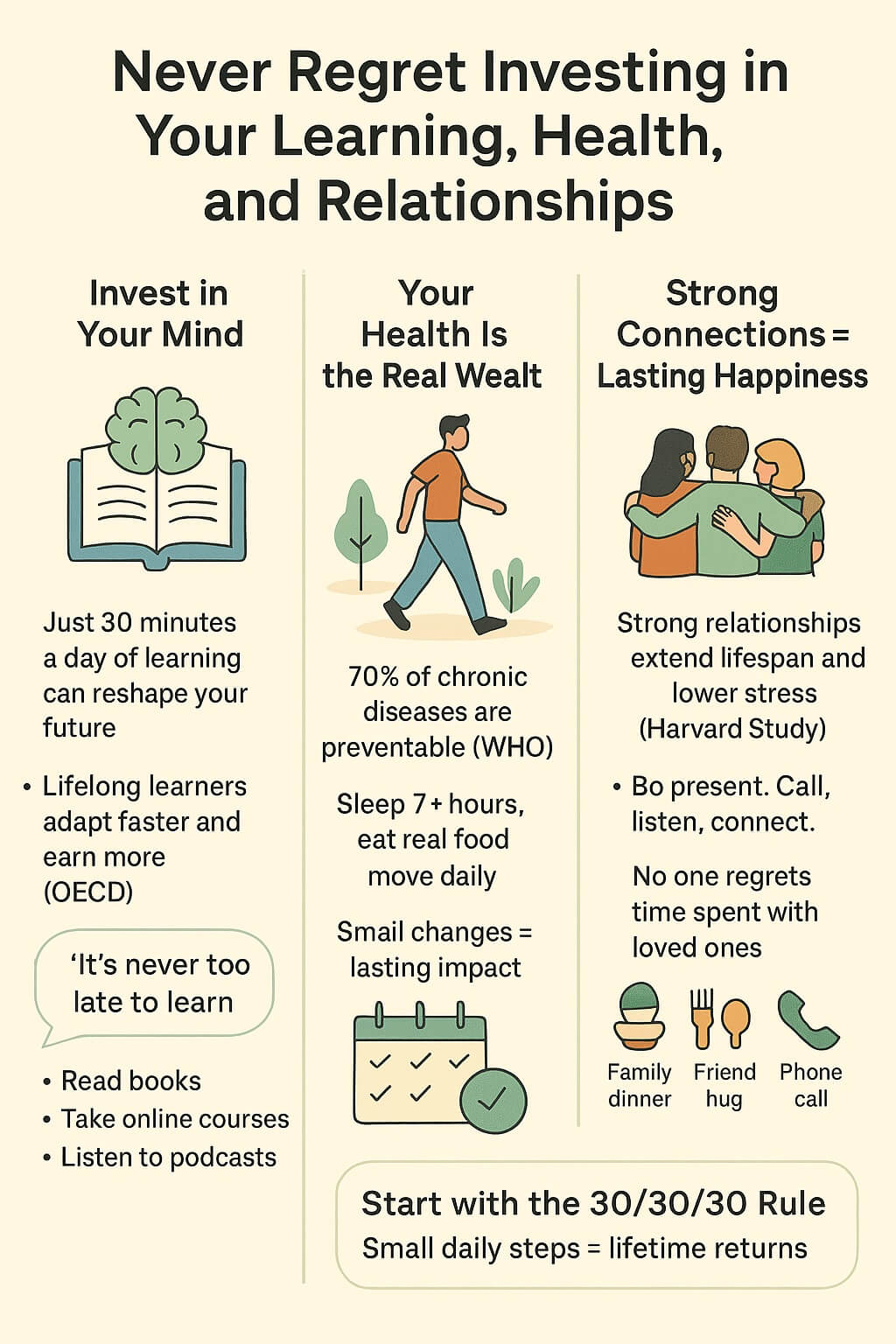
The Three Investments That Always Pay Off
People often spend decades chasing promotions, higher paychecks, and status, thinking these will bring lasting happiness. But ask those who’ve lived long enough, and you’ll hear a different story. Most regrets aren’t about money—they’re about missed chances to grow, poor health decisions, and relationships left unattended.
If you’re wondering what truly matters in the long run, this piece will help you find the answer. We’re breaking down why investing in learning, health, and relationships will always be worth it. Whether you’re 25 or 65, it’s not too late to start making smart choices that pay off long-term.
Let’s explore why these areas deserve your time and energy more than anything else.
Table of Content
- The Three Investments That Always Pay Off
- Learning: The Only Investment That Keeps Giving
- Health: Where Everything Else Begins
- Relationships: The Core of Emotional Well-Being
- What You Risk by Ignoring These Areas
- Why We Delay What Matters Most
- Simple Ways to Start Without Burning Out
- People Who Prioritized the Right Things
- Long-Term Benefits You Can’t Measure in Money
- Why These Three Investments Last a Lifetime
- Conclusion: Begin Now, Thank Yourself Later
- FAQs

Learning: The Only Investment That Keeps Giving
Why Lifelong Learning Pays Off
Education isn’t about getting degrees. It’s a mindset. People who never stop learning are better equipped to deal with change and find meaning. Lifelong learners adapt faster, build confidence, and often find purpose in personal growth.
UNESCO reports that lifelong learning is linked to better career mobility, mental health, and civic engagement.
From Late Bloomers to Lifelong Achievers
Think of Julia Child, who discovered cooking in her late 30s, or Colonel Sanders, who started franchising KFC in his 60s. These examples show it’s never too late to learn and succeed. Carol Dweck’s research on growth mindset proves that people who believe they can improve usually do.
Learning Rewires Your Identity
Every new skill learned, whether coding, photography, or public speaking, shapes how you see yourself. That self-perception changes your actions. Learning isn’t just about acquiring information—it’s about becoming someone who believes they can do more.
Numbers Speak for Themselves
-
Harvard Health says ongoing education slows cognitive decline in older adults.
-
OECD reports show higher education levels lead to better job security and income.
Health: Where Everything Else Begins
Your Body Is the First Home You Live In
Good health isn’t a bonus—it’s your base. Without it, everything else becomes more challenging. Simple habits like moving your body, eating fresh foods, and getting enough sleep are low-cost and high-return investments.
WHO reports that 70% of chronic diseases are preventable with daily habits.
A Wake-Up Call from Experience
In my twenties, I believed sleep was optional, fast food was fuel, and rest was weakness. It caught up with me. Constant fatigue, weight gain, and mood swings—it all boiled down to poor choices. Slowly, I swapped soda for water, started walking daily, and added a consistent sleep routine. Within weeks, I felt like myself again.
Daily Habits That Add Up
-
Get at least 7 hours of sleep
-
Walk for 30 minutes a day
-
Focus on real, unprocessed foods
-
Drink water before reaching for caffeine
The Payoff
-
Physically active people spend $2,500 less yearly on healthcare (American Heart Association).
-
Movement cuts depression risk by 30% (Harvard Medical School).
Relationships: The Core of Emotional Well-Being
The Most Reliable Predictor of Happiness
The Harvard Study of Adult Development has tracked people for over 80 years. Its conclusion? The quality of your relationships—not your money or achievements—matters most for long-term happiness.
Missed Time, Missed Moments
According to Pew Research, three out of four older adults wish they had prioritized their relationships more. Skipped birthdays, ignored phone calls, and choosing overtime over family dinners can’t be reversed.
What Connection Looks Like
-
Being present at the dinner table
-
Calling a friend instead of texting
-
Asking deeper questions: “How are you really?”
The Science Behind It
-
APA studies show that strong social ties reduce the risk of anxiety and depression.
-
NIH reports that close relationships are linked to longer lifespans.
What You Risk by Ignoring These Areas
Neglecting your health, personal growth, or relationships often leads to regret. People may have full bank accounts and empty lives. Stanford’s Longevity Project found that neglecting personal development and relationships lowered life satisfaction, even for those financially comfortable.
Why We Delay What Matters Most
“I’m too busy.” “I’ll start next year.” “I’m not ready.”
Sound familiar? These reasons feel valid until they no longer do. Often, a life event—a health scare, a job loss, a breakup—becomes the wake-up call. But we don’t need to wait for that moment to start.
Simple Ways to Start Without Burning Out
Try the 30/30/30 Rule
-
30 minutes learning: read, listen, or take a course
-
30 minutes of movement: walk, stretch, dance
-
30-minute relationships: connect with someone meaningful
Build on Habits You Already Have
-
Call a loved one during your evening walk
-
Listen to an audiobook while cooking
-
Stretch while watching a show
People Who Prioritized the Right Things
-
Warren Buffett reads over 5 hours daily and credits reading with his decision-making.
-
Oprah Winfrey prioritizes mental well-being and emotional balance.
-
During his presidency, Barack Obama sat down for dinner with his family.
None of these habits is out of reach. They’re built from intention, not income.
Long-Term Benefits You Can’t Measure in Money
Over time, you’ll find that these investments create something deeper than financial success. You’ll feel better, think clearly, and connect more.
You’ll laugh more, stress less, and look back without the heavy burden of regret.
Why These Three Investments Last a Lifetime
Learning grows with you. Health carries you. Relationships lift you.
Jobs change. Income fluctuates. But your energy, mindset, and emotional support systems stay with you. They're your true wealth.
Conclusion: Begin Now, Thank Yourself Later
You don’t need to make sweeping changes. Start small, stay consistent. Read one page. Walk ten minutes. Make one phone call.
Every positive choice you make adds up. These three areas—learning, health, and relationships—offer the highest return. And when you look back, these will be why you feel proud, not regretful.
FAQs
1. What’s a simple way to learn daily without changing my routine?
You can listen to audiobooks or podcasts while driving, cooking, or walking. Start with just 15 minutes daily.
2. How do I stay healthy without time for the gym?
Focus on habits that fit your day—walk while on calls, cook simple meals in batches, and stay hydrated.
3. Why are relationships more important than material goals?
Achievements are temporary. People remember how you made them feel, not your resume. Emotional support also boosts long-term well-being.
4. What if I’ve neglected these areas for years? Is it too late?
It’s never too late. Every step you take now improves your future, whether you’re 20 or 70.
5. Can these investments help with stress and anxiety?
Yes. Physical activity, learning new skills, and connecting with people are all proven ways to reduce stress and build emotional strength.





